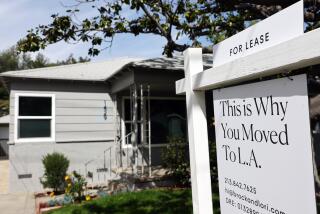A Safe Place Off the Streets : Laudable partnership secures apartments for mentally ill homeless people
- Share via
One out of three homeless men and women is mentally ill, according to estimates by providers of social services. These people, whose conditions may be aggravated by crowded shelters, should have decent, affordable housing tailored to their needs. It’s hard to find.
Soon, 22 fortunate men and women will get that type of housing in South Los Angeles, thanks to a laudable partnership between government, nonprofit organizations and a generous developer.
The developer, Mort LaKretz, donated a small motel worth $1 million to the Mental Health Assn. of Los Angeles. That nonprofit group will use part of a $3.7-million grant from the federal government to keep rents low for people forced to live on the margin.
Federal housing funds aren’t exactly easy to come by. In this case, city officials teamed up with the Shelter Partnership, a respected organization that assists in the development of housing for the homeless, to compete successfully for the grant. The $3.7 million will be shared among six other groups--the AIDS Healthcare Foundation, Hollywood Community Housing Corp., the Salvation Army, Los Angeles Men’s Place, Valley Housing Corp./Hillview Mental Health Center and Venice Community Housing Corp. They will use the funds to develop new rental housing and subsidize existing affordable units. As many as 200 homeless people will benefit.
The homeless men and women who are lucky enough to get one of the new apartments in the motel will pay only a third of their limited incomes for rent. They will live independently in a setting that includes support services.
Much more affordable housing is needed. The Shelter Partnership estimates that between 20,000 and 30,000 people--including a growing number of children--are homeless in Los Angeles.
Surely, some other developers would be willing to follow the lead of LaKretz, whose gift will transform a motel that had frequently rented rooms by the hour into a valuable social asset. And surely others are willing to tackle the tough job of developing low-income housing for those who live on our streets.
More to Read
Sign up for Essential California
The most important California stories and recommendations in your inbox every morning.
You may occasionally receive promotional content from the Los Angeles Times.






